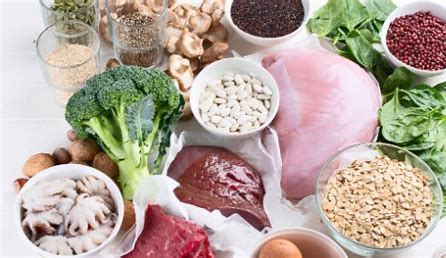You may put your fatigue down to a busy job, or the demands
of a growing family. But it could also be due to iron deficiency – and it’s
easily fixed.
Feeling wiped out? Finding it hard to concentrate? Picking
up every bug going around? Or maybe you can’t exercise at the intensity you
used to, find yourself getting breathless walking up a gentle hill, or notice
you’re often a little dizzy or lightheaded. It’s time to see your GP, as these
are all signs of iron deficiency.
What does iron do?
You learnt at school that iron transports oxygen around the
body in your blood, but it’s also involved in energy production and immune
function. So if you’re not getting enough iron – due to insufficient intake
from your diet or a problem absorbing it – you can end up with a whole range of
symptoms from fatigue, brittle nails and pale skin to dizziness, cold hands and
feet and trouble concentrating. You can even develop unusual cravings for
substances such as ice or dirt, a condition known as pica.
Who is most likely to be lacking in iron?
Worldwide, iron deficiency is the most common nutritional
disorder. Those most at risk include menstruating women (because of blood
loss), pregnant and lactating women, babies and toddlers, teenage girls and
female athletes.

There’s also some evidence that globally, vegetarians and
vegans are more at risk too, because they don’t eat any meat or fish – foods
that contain the more absorbable form of iron called haem iron. However,
vegetarians who eat a well-balanced diet are no more likely to have iron
deficiency anaemia than non-vegetarians.
If I think I’m low in iron, should I take a supplement?
It’s important to hold off on the supplements until you know
iron is the problem.
The only reliable way of telling if you are iron deficient
is through a blood test, so always visit your doctor to get checked out. All
those symptoms such as fatigue, dizziness and breathlessness can indicate other
health conditions, too. Incorrectly self-diagnosing can be dangerous and may
delay you getting the treatment you need.
Another reason not to rush into buying iron supplements is
that even if you are iron deficient it may not be a problem with your diet. You
could have difficulties absorbing iron due to a gastrointestinal disorder such
as coeliac disease, or you’ve been a bit heavy handed with zinc supplements,
which can affect iron absorption too.
Taking additional iron when you don’t need to can also
interfere with your body’s absorption of other vital minerals, such as zinc and
copper.
And if you do need supplements, always take them exactly as
your doctor advises. That’s because the human body isn’t particularly good at
excreting iron, and you could poison yourself if you take more than the
recommended dose.
Children are especially at risk of iron toxicity, so always
keep iron supplements tightly capped and out of children’s reach.
Should I eat more red meat?
Depending on your level of deficiency, you may be able to
restore your iron levels through eating more iron-rich foods. While red meat is
a particularly good source of iron, some actually get most of their iron from
non-meat sources, such as wholegrains.
Good source of iron include:
- Meat, poultry, organ meats like liver, and seafood. These contain the more absorbable heme iron.
- Wholegrains, and iron-fortified breakfast cereals and breads.
- Dark green leafy vegetables such as broccoli, spinach and kale; dried fruits including raisins, prunes and dried apricots; nuts and seeds; and legumes such as dried beans, peas, lentils, and soy beans (including tofu).

Vitamin C increases iron absorption, so eat plenty of
brightly coloured fruits and vegetables with your meals.
Avoid tea and coffee around mealtimes as the tannins in them
can bind to iron, making it harder for your body to absorb.